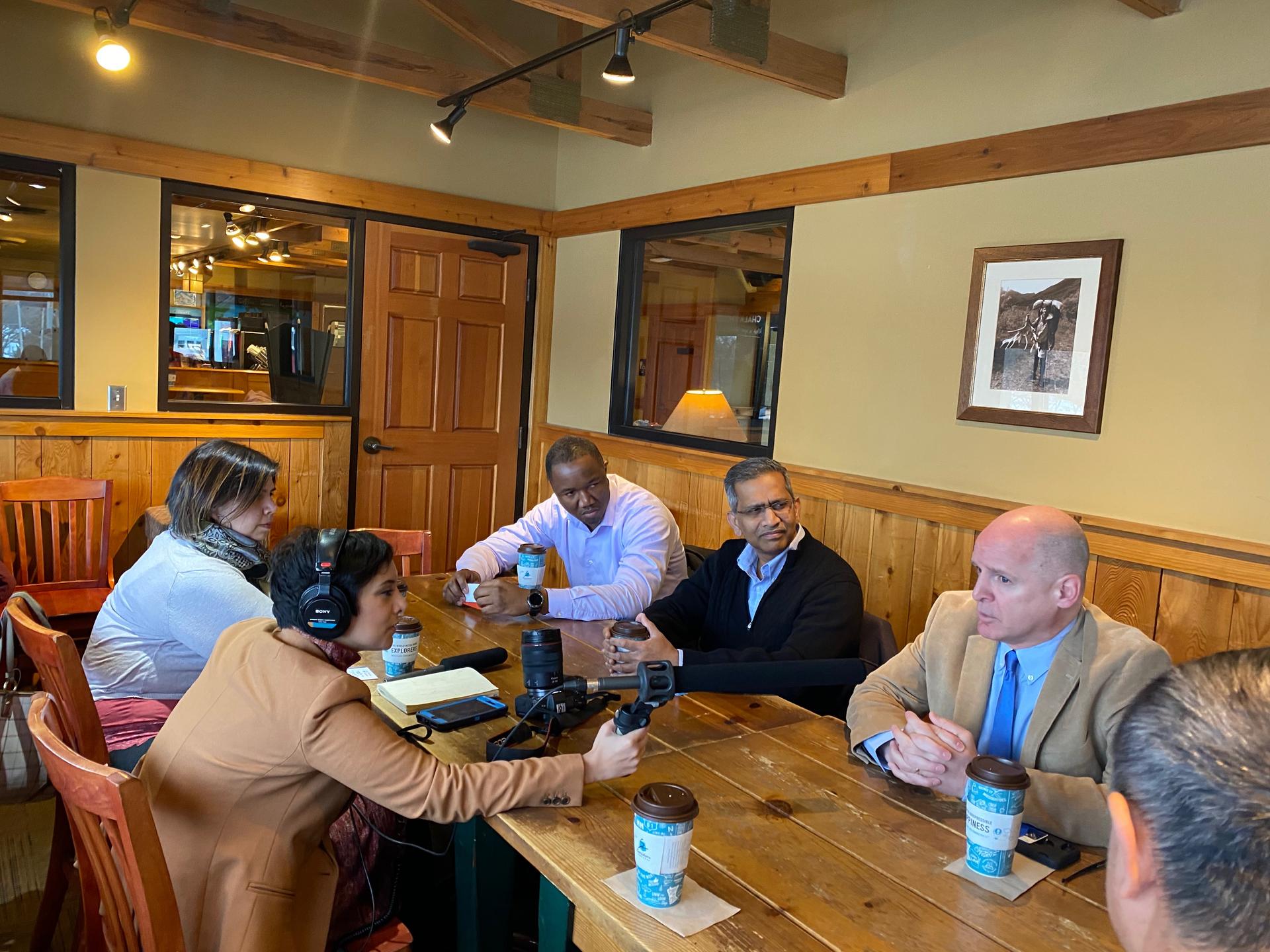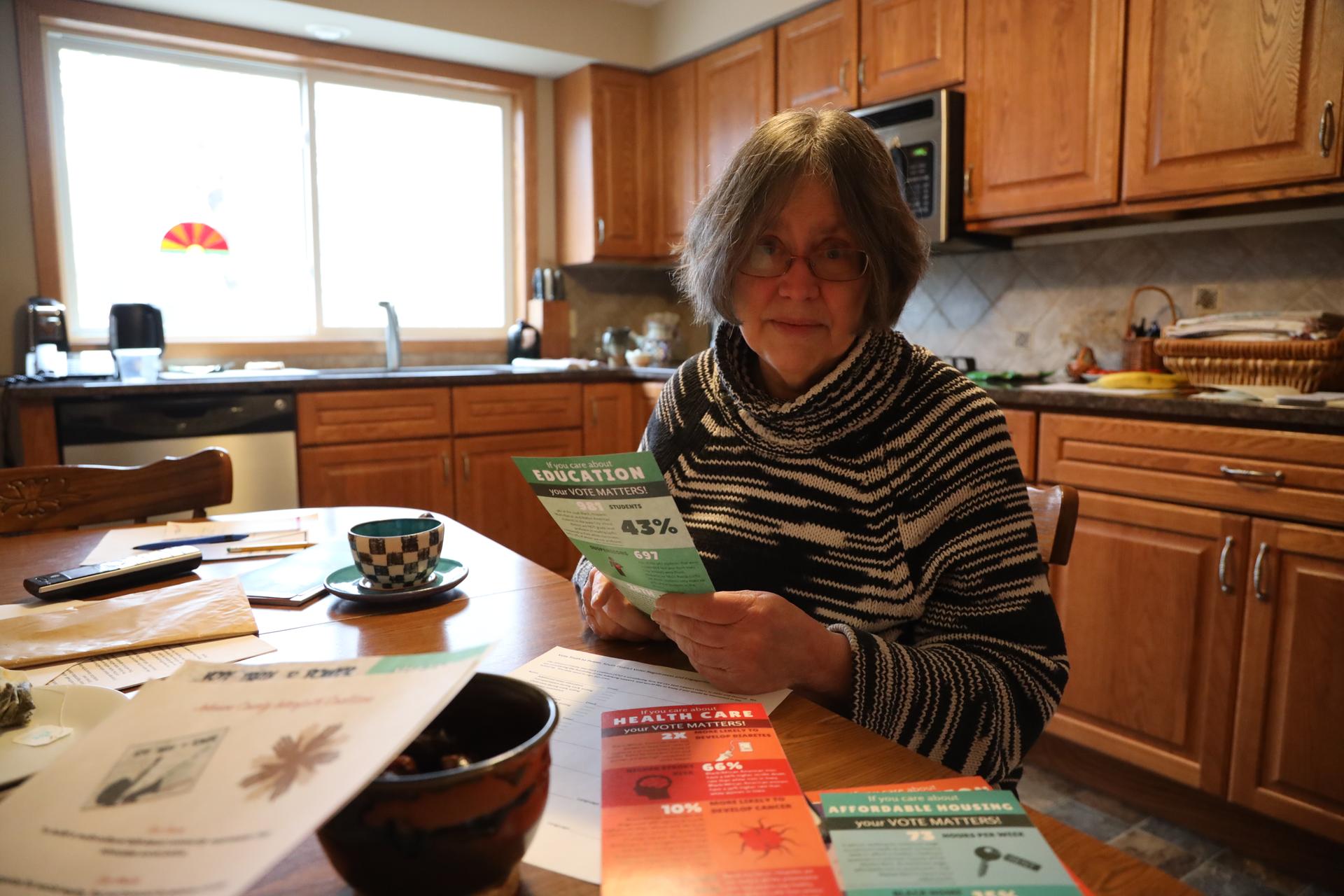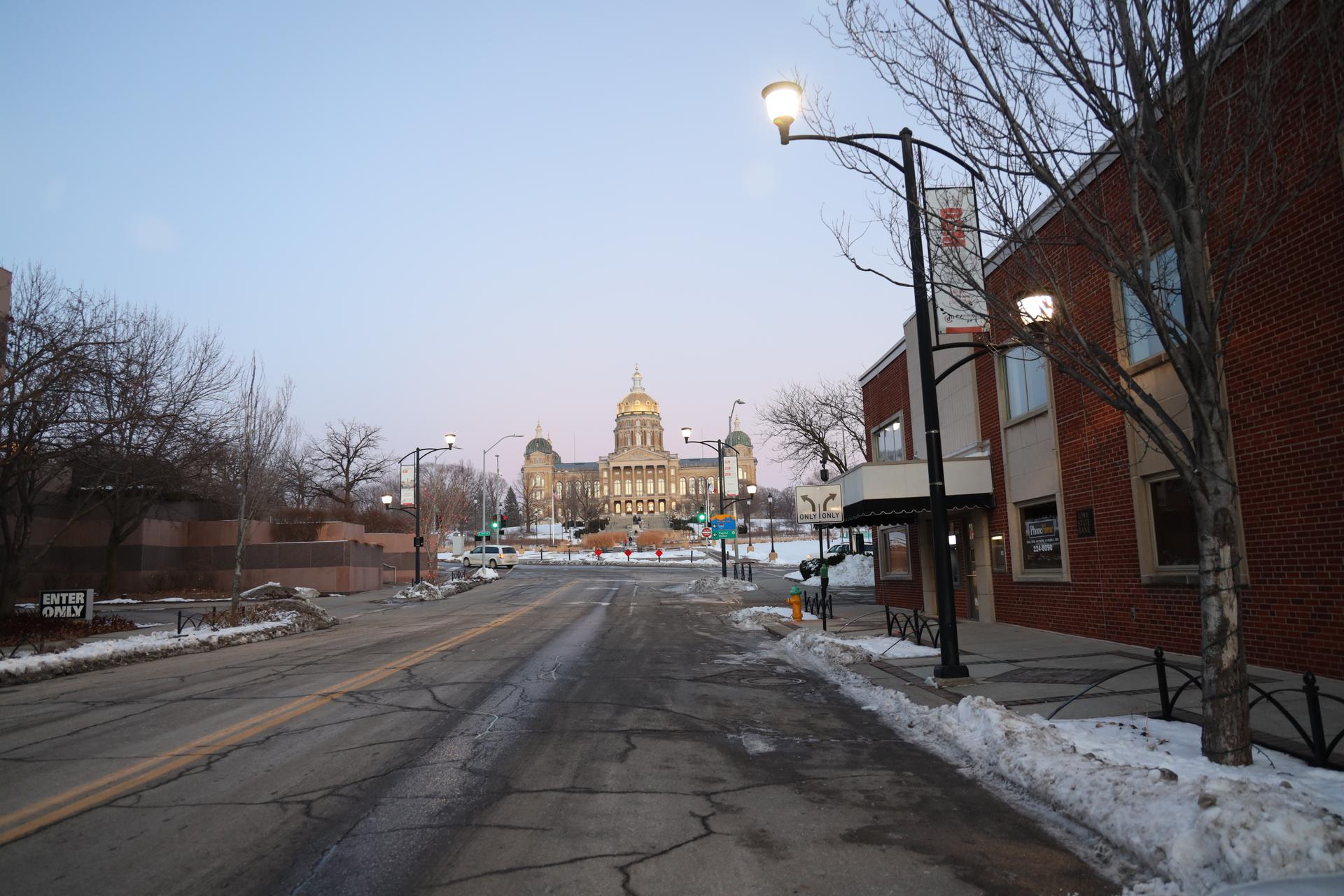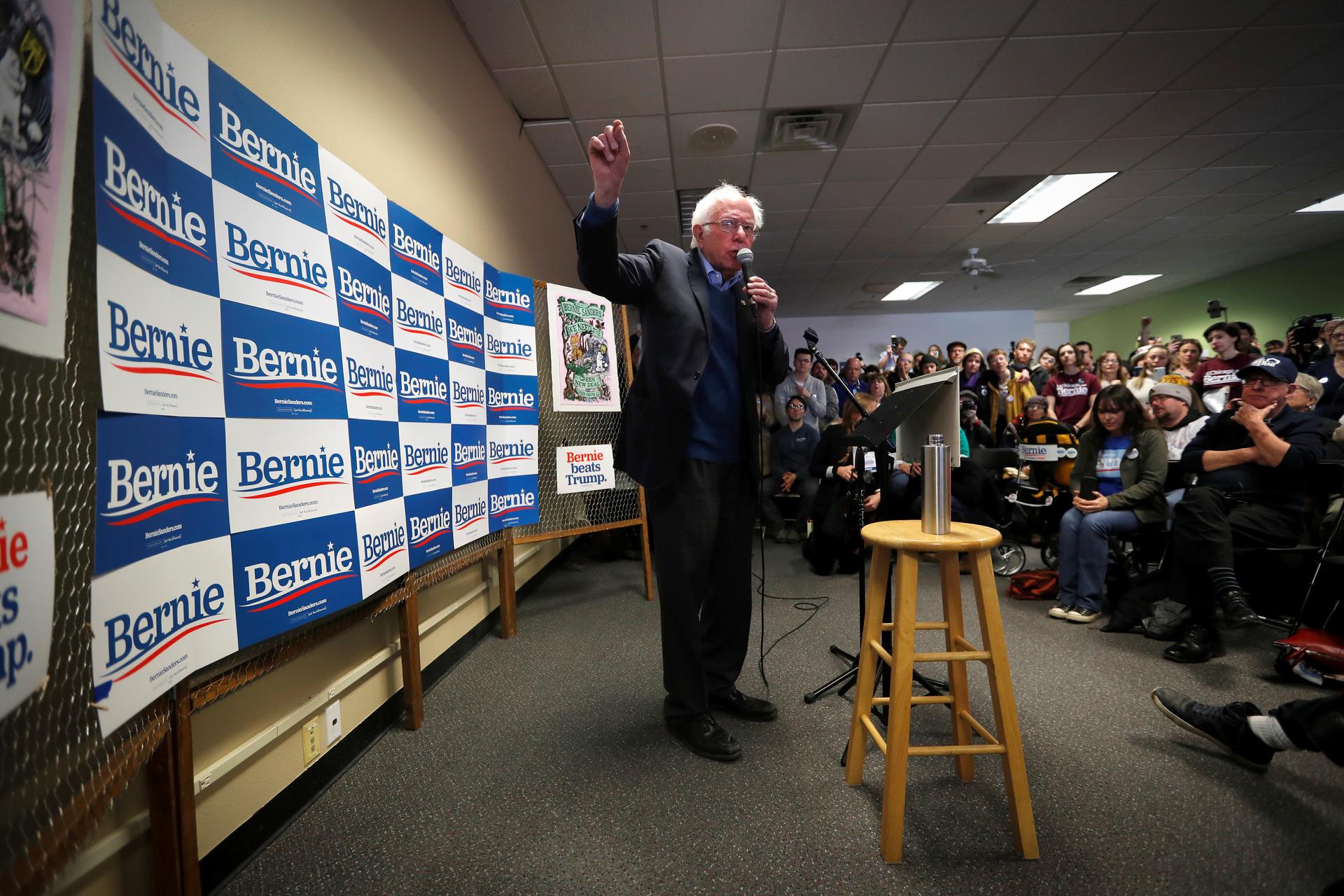Iowans debate how to make the caucuses more inclusive
Democratic US presidential candidate Sen. Bernie Sanders speaks to supporters and volunteers at a campaign field office in Iowa City, Iowa, Feb. 2, 2020.
The Iowa caucuses are a good time to be a cab driver.
“I meet all these journalists, CNN reporters, I pick them up and take them to their hotels,” said Sam Akec, who arrived in Iowa from Sudan in 2000, and at first helped out at the Republican caucuses because he appreciated Republican President George W. Bush’s foreign policy on Sudan.
After Akec became a citizen in 2006, though, he switched to the Democrats because he liked Barack Obama.
“I was so happy. I’d never voted in Sudan.”
“I was so happy,” he said. “I’d never voted in Sudan.”
Related: Will Iowa farmers benefit from Trump’s newest deals with China and Japan?
Akec is proud to be part of a long tradition in Iowa — for nearly a half century, every four years, the world’s eyes have focused on Iowa for the first decision in the election of a leader for a global superpower. Also over the past 50 years, Iowa has seen an unprecedented wave of nonwhite immigration, bringing diversity to a state settled mostly by Europeans.

Those two trends are colliding this year in part because race is such a big issue in the election. Iowa has been criticized as too white to be one of the early states where many candidates are weeded out.
The conversation has led Iowans to turn inward — to consider how many immigrants and refugees rise to positions of political power, and how accessible the caucuses are for everyone. Four years ago, Akec helped out on Hillary Clinton’s campaign — and tried to caucus for her. But he and his family were a few minutes late to their caucus site and weren’t allowed in.
“What can you do?” he sighed. “We work two to three jobs. Life ties you down. What can you do?”
Making the Iowa caucuses more inclusive
The Iowa caucuses were originally created to make the process of choosing the Democratic presidential nominee more accessible, but the process itself can make that difficult.
“There’s been discussion about whether or not we should encourage non-English speakers to attend the caucuses because it is very confusing and it’s really, really crowded,” said retired University of Iowa librarian Donna Hirst, who chairs an interfaith coalition in eastern Iowa that holds events to get diverse groups involved in the election process. “There’s been concern that a brand new voter might go to the caucuses, and it might be a really negative experience and they may never vote again because of the caucuses.”
This year, Iowa Democrats are rolling out many changes aimed at making the caucuses even more inclusive. One way they’re doing that is by creating Spanish-speaking caucus sites and providing interpreters, although activists say there won’t be enough to meet the demand.
Another way Democrats are trying to increase participation is by allowing Iowans around the world who qualify to go through an online training to host satellite caucuses.

The state that launched Obama
Iowa’s population of foreign-born residents doubled by 2000, while the state’s reputation grew as a place that carefully evaluated candidates. For many Iowans, their wisdom was proven when the son of a Kenyan, Obama, won the Iowa caucuses, and then went on to win the presidency.
And that’s the first thing they point to now when critics like former Democratic presidential candidate Julián Castro argue that Iowa doesn’t represent the diversity of the country, and so shouldn’t be first to choose presidential candidates.
In response, even the chair of the Iowa Republican Party points to Iowa’s role in Obama’s rise.
“For crying out loud, we made Barack Obama in this state,” said Jeff Kaufmann. “It belies common sense to me, essentially implying that Iowa Democrats can’t get past the color of one’s skin after launching Barack Obama.”
Staying first in the nation is so important that even though he’s state Republican chair — and even though Iowa went to Trump in the last presidential election — Kaufmann refuses to say that Iowa is a red state. Because he wants it to stay the unpredictable, first state in the nation.
“We are purple now. Now, we’re a little bit deeper shade of purple. And I have every intention of trying to keep this state as red as it has been, especially in national politics,” he said. “But look, we are a swing state. And what that means is that nobody is ever going to take us for granted. As long as we are not predictable, we’re going to continue to be right in the eye of the storm.”
Related: You’re young and broke. Here’s how to still win a congressional seat.
A lack of diversity
According to census data, Iowa is 4% black, 6% Latino, and 90% white.
That lack of diversity has kept a lot of immigrants and refugees from running for office — even though, Vanessa Marcano-Kelly said, it’s a lot less challenging than they think.
“It’s there. It’s accessible,” said Marcano-Kelly, a Spanish interpreter who’s originally from Venezuela and recently petitioned state Democrats to hold Spanish-speaking caucus sites. “But we have to get through the barrier of [people] saying, ‘Well, I haven’t done anything for like this amount of years. Nobody’s heard my voice.’ But then we have to push back and say, “But have we even raised our hand to say anything?””
That’s exactly what software engineer Suresh Reddy asked himself. He’s an Indian immigrant who says he lived in Iowa for 16 years before the Trump presidency made him want to get involved in politics. He won a seat on the Johnston City Council. Reddy said all it took was talking to voters.
“If I was in India trying to do this, I would never have done this. That requires money, influence,” he said. “Here, anybody can raise your hand and say, ‘I will be part of this process and I will run through this thing, make it happen.’ And that’s just exactly what I did.”
So did Armel Traore dit Nignan, a consultant for one of the big insurance companies based here. Former presidential candidate Cory Booker endorsed dit Nignan’s run for a seat on the Waukee School Board in another Des Moines suburb.
Related: The most ‘broken’ town in America is back on its feet

“It’s majority white, probably as white as you would come — 99% white,” dit Nignan said. “And I walked in, and some places, literally the first thing I heard was, ‘There’s two things that I care about: the NRA and God.’ And if you don’t have those two as your highest priority, they won’t talk to you.”
But after an hour of conversation, people promised him their vote, dit Nignan said, because they could agree on specific local issues. Dit Nignan didn’t win, but he still believes Iowans judge candidates on their platform, not their identity.
“We assume diversity is good,” he said. “Diversity is not necessarily good. Inclusion is good.”
Nonpartisan Latino Political Network co-founder Rob Barron’s Mexican grandparents immigrated to Iowa, and he was born here. He worked for Democratic US Sen. Tom Harkin and seven years ago, ran for a seat on the Polk County School Board in another Des Moines suburb.
“I won that school board race, and I said, ‘One of the reasons I want you to vote for me is because I’m Latino and because this district is 25% Latino,’” he said. “I also said it in English in an Iowa accent, with a Spanish last name that generations ago had been Americanized.”
He argues if Iowa were really inclusive, it would have at least nine Latino state legislators based on the Latino population. Right now, it has none. By Barron’s count, there are 28 Latino elected officials in Iowa, almost all on school boards and city councils.
Barron said those are important positions and steppingstones to higher office. He tells a story about being at a school board meeting where district staff did a presentation about their website.
“And it just occurred to me when we got around to the questions to ask how much of the content that we create as a district is in a language other than English,” he recalled. “And bless their hearts, they answered ‘none.’”
Within two months, their website was translated into seven different languages, Barron said — and, he said, that’s why representation matters. And that’s why Barron thinks what former candidate Julian Castro suggested — that Iowa shouldn’t go first in the presidential nominating process because it is overwhelmingly white and doesn’t represent the diversity of the nation — has some merit.
Barron said Iowans have proven they take their role as first in the nation seriously; they’ve evaluated candidates fairly, and been good stewards of the process of electing a president. But Barron doesn’t think people should ignore the fact that Iowa doesn’t have many elected candidates of color.
“I want us to stay first. But I also think we have to earn it,” he said. “And I think part of earning it is accepting the fact that we have diversity. We don’t have well-defined paths to power.”
As for Akec, he hopes someone from the Sudanese community will run for office someday.
“It’s not that easy. You’ve got to have money to do that, you’ve got to have connections to do that. You can hear me, I’ve got an accent, so a lot of people cannot hear me,” he laughed. “But hopefully, one of my kids will do it someday. Who knows.”
Akec has six kids, so he figures it’s safe to be hopeful.
